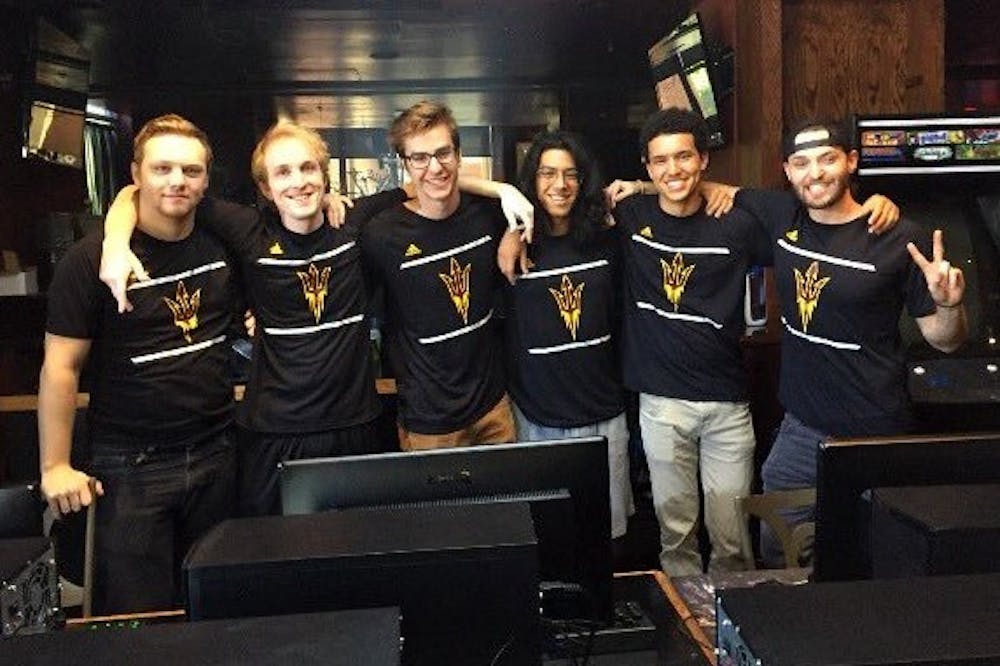Heroes of the Dorm is only the start of a bright future for the collegiate eSports industry. Despite several issues in its inaugural year, the overall success of the first tournament paved a way for the emergence of a geeky March Madness single-elimination-style bracket.
By marketing Heroes of the Dorm to a college audience, Blizzard Entertainment and Tespa have connected fans of a college athletics program to an eSports team. Last year, ASU fans tuned into ESPN when news broke that the Dream Team was in the final round, blowing up social media with posts cheering on ASU despite not know what was going on. When Univeristy of California Berkeley defeated ASU, some athletes of physical sports joined in on the fun, tweeting about a rematch between the two school's football teams.
Nov. 28, 2015. Berkeley, Calif.
— Sun Devil Football (@FootballASU) April 27, 2015
Tespa co-founder Adam Rosen said eSports are compelling because of the rich storylines within the competitions.
“What brings people together when watching a competition like this is that background, that shared history," he said. "When I watch an eSports competition, I might not know any of the players but I know ASU and I know Cal and in some way, I have a connection to one of those schools. I may hate one of them, I may be rooting for one of them. It gives us a natural way for someone who may not have been exposed to eSports yet to take a look into the world and fall in love.”
Tespa started as a college movement at University of Texas Austin and has since grown into the largest collegiate eSports program in America, connecting over 150 chapters on college campuses with competitions for Hearthstone, Heroes of the Storm and Starcraft II. ASU currently does not have a Tespa chapter, but clubs like the League of Legends community and eSports Association have connected college gamers looking to form teams.
With no natural fit on television since G4 went off air, eSports has been limited to Twitch streams and Youtube. Prior to ESPN and Yahoo launching eSports coverage, there wasn’t an acceptance that mainstream audiences could create a fanbase for professional gamers. With its rise in popularity, athletes like Shaquille O’Neal and Alex Rodriguez have begun investing in professional teams.
“We’ve also seen a lot of growth with tournaments that bring college players together from around the continent to engage in that pastime and really be able to compete for a chance to better their life by doing so,” Tespa co-founder Tyler Rosen said. "Heroes of the Dorm, for example, is the latest opportunity, the latest big competitive tournament that we have that has brought together hundreds of different universities and thousands of students together to make sure that they have the opportunity to compete in eSports.”
Just like collegiate athletes, players log hours of practice into playing their game. On average, the Real Dream Team scrimmages 4-6 hours per day, five days of the week, with individual players logging in extra practice time by streaming on Twitch and playing on their own. Additionally, business communication sophomore Michael “MichaelUdall” Udall and sociology senior Austin "Shot" Lonsert spend several days researching their opponents to prepare for upcoming games.
“As we’re getting further into the tournament, we don’t want to have any mistakes happen so we want to be sure that we’re polished every single day, working on new strategies every single day or refining old strategies,” Lonsert said. “A big change just happened to the game, like characters got updated and changed, there’s just a lot going on with the game itself right now so we have to put in this extra time and effort to make sure that we understand the game completely and where the meta is shifting to make sure that we’re on top.”
Robert Morris University, who the Real Dream Team knocked out in the Round of 64, became the first university to bring online sports into their athletic program and offer scholarships for members of their Varsity eSport League of Legends team. The team will join ASU's Sun Devil Summoners in the Collegiate Star League.
Although ASU hasn’t officially adopted eSports into their athletics program, the athletics department has shown their support by creating a practice room for the team and giving them custom T-shirts, according to business and communication senior Vann “Vannity” Childs.
“I think Arizona State is a very progressive school,” Childs said. “They’re going to be at the forefront of eSports in colleges. The issue is if other schools follow suit. It doesn’t matter if ASU puts together all these awesome teams if there’s no collegiate tournaments. Heroes of the Dorm last year introduced a lot of liability in the potential for a collegiate version of eSports. I think ASU is poised to be on of the top eSports colleges.”
The Real Dream Team will take on the University of Connecticut on Saturday in Seattle for the Heroic Four round of the Heroes of the Dorm tournament, which will be broadcasted on ESPN2.
Related links:
Real Dream Team sweeps Utah in Tespa championship
ESPN made significant push for eSports and ASU was a major part of it
Reach the reporter at dlbarnet@asu.edu or follow @danicalbarnett on Twitter.
Like The State Press on Facebook and follow @statepress on Twitter.




